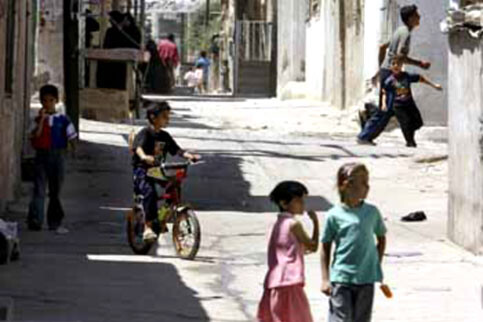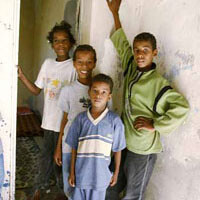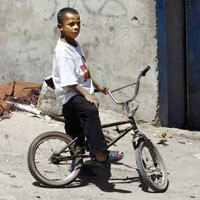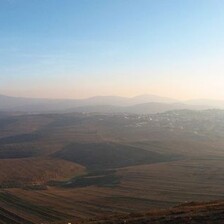The Electronic Intifada 22 December 2003

Children play along the dusty streets of the Baqa’a refugee camp, near Amman, Jordan (Photo: UN/DPI/Stephenie Hollyman, 2003)
Amman, Jordan — Al-Baqa’a is Jordan’s largest Palestinian refugee camp, located on the outskirts of Amman and home to more than 100,000 refugees. In the heart of one of Jordan’s many desert valleys, at night, Al-Baqa’a is a beautiful array of lights sparkling below the wealthy hilltops of Amman. But, when visiting Al-Baqa’a during the day, it emerges as an impoverished Palestinian community of countless markets and shops lining small crowded streets of makeshift homes.
The Palestinian refugees who make up Al-Baqa’a are from throughout the 1948 lands of Palestine, displaced by force from their homes during both the 1948 and 1967 Arab-Israeli wars. The residents of Al-Baqa’s are just one manifestation of the millions of Palestinian refugees scattered throughout the world.

In Baqa’a, Jordan’s largest camp for refugees from Palestine, children pose in the doorway of their UNRWA-constructed household. They attend one of eight schools in the camp, which are operated on a double-shift basis. (Photo: UN/DPI/Stephenie Hollyman, 2003)
Karameh is famous for a 1968 battle when over 15 000 Israeli infantry, supported by tank units and helicopters, marched over the Allenby Bridge. At the time, Karameh was the political and military headquarters of the Palestinian al-Fatah movement. At the Battle of Karameh, the technologically-advanced, better-equipped and larger Israeli army was forced to retreat, leaving Karameh to the Palestinians. The Battle of Karameh represented the Palestinians greatest military victory up to that time, and sent a surge of optimism through the Palestinian community, as well as helping establish the Palestinian claim to being a genuine national liberation movement.
However, the Israeli incursion left behind a destroyed village, forcing many Palestinian refugees to leave Karameh and re-settle deeper into Jordan, many at Al-Baqa’a.
The history of Palestinian resistance — as well as the struggle to keep alive the right of return — is apparent in any conversation with the residents of Al-Baqa’a. If you walk through Al-Baqa’a camp today and ask people on the street about the right of return, you will find a similar response: that like most other Palestinian refugees around the world, they are waiting, struggling and fighting to return to Palestine.

Palestinian boy poses in the streets of Baqa’a refugee camp (Photo: UN/DPI/Stephenie Hollyman, 2003)
As Abu Nayef, the camp’s representative to the Palestinian Liberation Organization (PLO) explained to me: “Palestinian refugees throughout the world have lost the three elements of life at the hands of Israel: their land, their blood and their dignity”.
For Abu Nayef a highly respected community leader displaced from his home in 1948, life in Al-Baqa’a is defined through the struggle to return to Palestine.
The daily conditions in Al-Baqa’a are a dramatic contrast to the modern, urban environment of Amman, just a 20 minute drive away. Al-Baqa’a originated in 1967 with tents and makeshift shacks, but now constitutes a community of small crowded homes, businesses, mosques and schools, all hastily constructed.
The Palestinians of Al-Baqa’a are historically self-reliant, having received minimal assistance from UNRWA (the United Nations Relief and Works Agency) or the Jordanian government. Like most Palestinian refugee camps throughout Jordan, the residents of Al-Baqa’a have been left to build their community independently, with little external economic support.
The small crowded streets of Al-Baqa’a make it impossible to for two cars to pass each other. The small markets and stores facilitate the little internal economy within the camp. The bulk of the camp’s economy is based on providing cheap labor to the more privileged areas of Amman. Dozens of buses leave Al-Baqa’a in the early hours of the morning, where thousands of Palestinian refugees clean the toilets and cook the food of Amman’s economic and political elite.
As Dr. Nabil Hirsh, a Palestinian refugee from Al-Baqa’a who founded a 24 hour health clinic more than 30 years ago, explains, “Many older women from the camp go to work in Amman as cleaners and maids for families and companies. Many men from the camp go to Amman to work in construction. This camp is Amman’s greatest supplier of workers”.
Given the poor living and working conditions, many of Al-Baqa’a’s youth are becoming increasingly disenchanted with life at the camp. As the manager of the Al-Baqa’a youth club, who asked not be named, explained, “Life is not good, our biggest problem is poverty. At this club we take care of over 120 children whose families can’t provide for them. The poverty here is so bad, there are no jobs, no employment. When visiting some families in the camp you will find that they have no food and clothes for their children”.
The millions of Palestinian refugees who are living in Jordan do not have the same economic and social opportunities as Jordan’s political and economic elites. Very few Palestinians hold positions in Jordan’s Parliament, where political decisions are made for a country whose Palestinian population is estimated at more than 60%. Jordan’s political and economic future, as well as its political stances towards Israel, are not determined by the majority of Jordanian residents who are displaced Palestinians.
Jordan’s ruling monarch, King Abdullah, recently launched a national campaign named “Jordan First” which has been presented publicly as a plan to end Palestinian-Jordanian tensions. However, making efforts to improve the conditions of refugees, and attacking the origins of the refugee problem, seems last on King Abdullah’s list of priorities.
In light of the structural political and economic disadvantages defining life for Jordan’s Palestinians, especially those living in refugee camps, it is the claim of “right of return” to Palestine that keeps people’s hope for a life of dignity alive.
The manager of the Al-Baqa’a youth club explained the right of return from the perspective of Palestinians living in the camps as follows: “Being a Palestinian refugee in Al-Baqa’a means that you are looking for Jerusalem daily; if you can’t see Jerusalem when waking in the morning, you see it in your dreams. We always look to Palestine our homeland.”
Al-Baqa’a is a living reminder of the tragedy of the world’s millions of Palestinian refugees. The right of return has been the central issue of the Palestinian struggle for liberation throughout the world, and it is likewise the central issue in the lives of the residents of Al-Baqa’a.
Currently major media has focussed on the recent signing of the Geneva Accord, negotiated by ex-Israeli and Palestinian politicians. One key concession of the Geneva Accord is for the Palestinian side to sign away the right of return for the worlds’ millions of Palestinian refugees.
When you ask about the Geneva Accord on the streets of Al-Baqa’a, people answer with disgusted looks as they see it as nothing but the further dismissal of the history of the Palestinian struggle in its failure to recognize that the right of return for Palestinian refugees. For the residents of Al-Baqa’a, the right of return is not something that can be negotiated away by corrupt politicians of the Palestinian Authority, or by any government or nation-state.
The stark contrast between the pronouncements of Israeli and Palestinian politicians in Geneva, and the words spoken by the people on the streets of Al-Baqa’a, are a reminder that liberation struggles cannot be defined by politicians, and that the principles of the Palestinian struggle are kept alive by those living on-the-ground in Palestine and in the refugee camps throughout the world.
As Khaled Ramadan a political activist with the Amman based group the Popular Committee in Support of Iraq and the Intifada explained, “Political agreements such as the Geneva Accord are an attempt to jump on the right of all Palestinians to return to all of Palestine. The Geneva initiative will meet many obstacles because the Palestinian people will struggle to return not only to 1967 territories but will struggle and fight to return to all of Palestine, this is our right.”
The terms by which the world views and supports liberation struggles must be set by those directly effected; in the case of the Palestinians, the majority of those directly effected are the refugees who make up 2/3 of the population. Palestinian refugees — the majority of which are scattered throughout the Arab world — continue to live as second class citizens in countries such as Jordan, Lebanon and Syria, where they endure impoverished living conditions in camps such as Al-Baqa’a waiting to return to Palestine. In the face of this fact the Geneva Accord is bankrupt, as it fails to recognize the loss of dignity, land and blood, which defines the history of Palestinians and their struggle for freedom.
Related Links
Stefan Christoff is a member of the International Solidarity Movement. The International Solidarity Movement is a Palestinian-led movement of Palestinian and International activists working to raise awareness of the struggle for Palestinian freedom and an end to Israeli occupation. Stefan also works with the No One is Illegal Campaign and is an independent journalist working with CKUT Radio Montreal & Free Speech Radio News.



